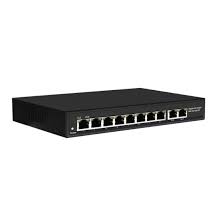For a high-quality Power over Ethernet (PoE) 8-port switch with 10/100 Mbps capabilities, you'd want a device that offers robust performance, reliability, and features suitable for your networking needs. Here's what you might look for in such a switch:
1. **PoE Support:** Ensure that the switch supports Power over Ethernet (PoE) functionality on all 8 ports. PoE allows the switch to provide power to connected devices such as IP cameras, VoIP phones, and wireless access points over the Ethernet cable, eliminating the need for separate power adapters.
2. **Quality of Service (QoS):** Look for QoS features that prioritize certain types of traffic to ensure that critical applications receive sufficient bandwidth and low latency, especially in networks with mixed data, voice, and video traffic.
3. **Port Speed:** Since you specified 10/100 Mbps, ensure that the switch supports both 10 Mbps and 100 Mbps Ethernet speeds on all ports. This allows for backward compatibility with older devices that may only support 10 Mbps Ethernet.
4. **Gigabit Uplink:** Consider whether you might need a Gigabit Ethernet uplink port for connecting the switch to your network backbone or router. This provides higher throughput for inter-switch connections and ensures that the switch doesn't become a bottleneck in your network.
5. **Fanless Design:** If noise is a concern or if you require a switch for a quiet environment, consider a fanless design that operates silently without the need for cooling fans.
6. **Management Features:** Depending on your requirements, you may want a managed switch with advanced management features such as VLAN support, port mirroring, SNMP monitoring, and configuration options for optimizing network performance and security.
7. **Reliability and Warranty:** Look for a reputable brand known for manufacturing high-quality networking equipment. Check reviews and consider the warranty and support options provided by the manufacturer.
Some examples of switches that might meet these criteria include models from brands like Cisco, Ubiquiti, TP-Link, Netgear, and D-Link. Be sure to compare specifications, features, and pricing to find the best fit for your specific networking requirements.
